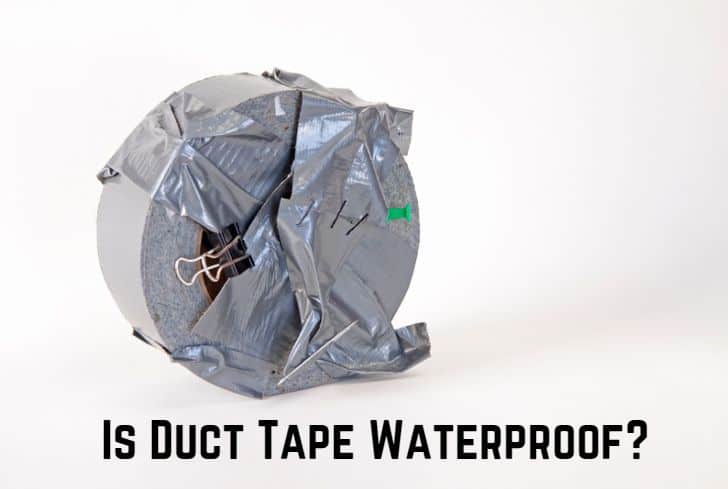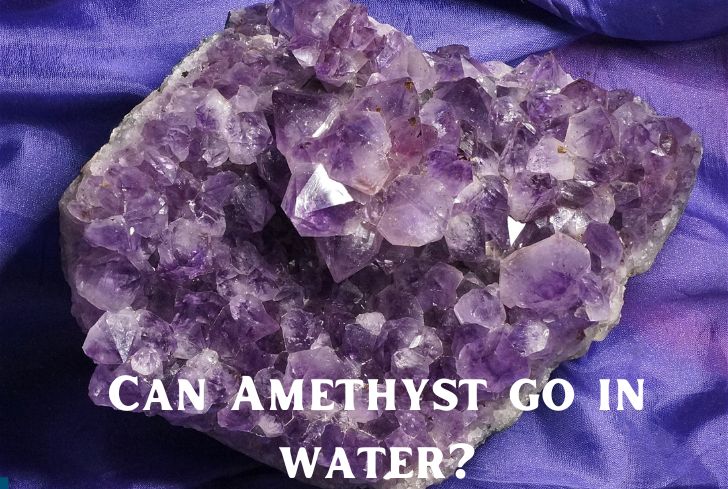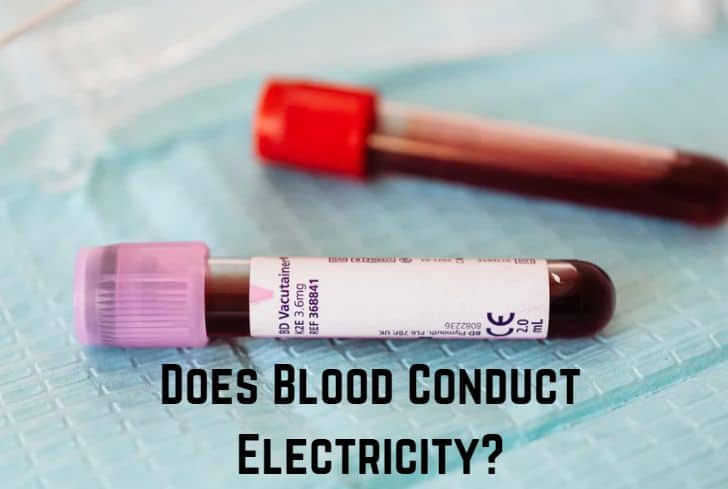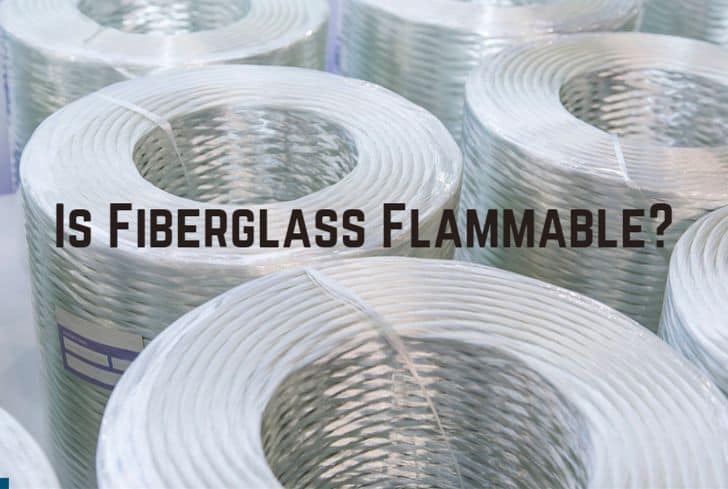Is Duct Tape Waterproof? (Quick Answer: No)

Duct tape is a pressure-sensitive tape that is made with strong cloth/plastic material combined with an adhesive backing. It was originally developed during the Second World War for military use, but it is now used for a variety of applications, thanks to its durability & flexibility.
Duct tape is useful everywhere from household repairs to industrial processes to DIY projects. But have you ever wondered if it is waterproof? In this article, we are going to discuss just that. We will also discuss how duct tape interacts with different surfaces and its best practices.
Read: Is Duct Tape Flammable? (Does It Burn?)
Is Duct Tape Waterproof?
No, duct tape is not waterproof. Generally, it is quite water-resistant but cannot provide complete protection against it. The level of protection that duct tape provides against water depends on its composition, the type of surface, and environmental factors.
First, let us first understand the difference between two commonly confused terms: waterproof and water resistant.
Waterproof means that the material is completely impervious to water. It can be fully submerged without getting damaged. For example, a waterproof raincoat may keep you dry even in heavy rain.
Water-resistant, on the other hand, means that the material can withstand some degree of exposure to water, but it is not completely impervious to it. For example, a water-resistant watch might resist some gentle splashing, but it will get damaged when fully submerged in water.
Most duct tapes are water-resistant. However, the surface on which you are using it is the most significant factor in determining the level of protection offered. GaffaTape conducted a 60-day weather test on several duct tapes and found that they work best on non-porous surfaces.
Examples of non-porous surfaces include metal & plastic, which provide a smooth, non-absorbent surface. This prevents the water from penetrating the adhesive and keeps the tape firmly in place.
Can Duct Tape be Used For Waterproofing?
Ideally, duct tape should not be used for waterproofing, but it can be used in some cases. It is water-resistant and can provide temporary solutions for small leaks in pipes, hoses, etc. You can also use it to repair other materials, such as tents.
Duct tape is not waterproof, meaning that it is not completely impervious to water. However, it is quite water-resistant, so it will provide some degree of protection against it. Therefore, when other options are unavailable, you can use duct tape for temporary waterproofing.
With duct tape, you can fix small leaks in pipes, hoses, or other equipment. Duct tapes can also be quite useful in emergency situations. Suppose, you are out camping, and your tent gets torn, then you can use duct tape to patch the hole; this will help keep out rainwater.
If your car breaks down due to a ruptured hose, then also you can try using duct tape temporarily, and hopefully, it should help you get to a proper repair shop. In general, duct tapes serve a variety of purposes, so it’s always good to keep them handy.
There are certain things that you should keep in mind while using duct tape for waterproofing:
- Smooth surface: Duct tape works best on non-porous surfaces like metals and plastics. But, irrespective of the nature of the surface, you must always ensure that it is clean—this makes the duct tape have a solid connection with the surface. Otherwise, if the surface has oil, grime, or debris, the tape will stick to that instead; this will lead to gaps through which water can seep in and damage the adhesive.
So, make sure you clean all dust from the surface. Then you can also use a sander to smooth it. The surface should also be dry before applying the tape.
- Proper storage: For best results, you must ensure that the duct tape is stored in a proper place. Avoid keeping it in areas with extreme temperature changes or those which are exposed to environmental elements. Storing duct tape in sunlight can also be quite harmful, as it can cause the tape to become cracked or wrinkly. Therefore, keep your duct tape in a place with moderate temperature, away from sunlight.
How Waterproof is Duct Tape?
Duct tape is not waterproof; it is only water-resistant. This means that it can provide some degree of protection against water but is not completely impervious to it. The adhesive in duct tape is generally made from rubber-based material, which can usually withstand some exposure to water.
Duct tape typically has three layers. The top layer is made up of polyethylene material that provides a moisture-resistant barrier. It is the first layer of defense for the duct tape, and if it breaks down, the other layers will also get soaked & damaged.
The middle layer consists of a fabric mesh, which provides strength & durability to the tape. It also allows the tape to be easily torn, ensuring ease of use. The bottom layer consists of the adhesive, which sticks to different surfaces.
The adhesive used in duct-taped is generally made from a rubber-based material. This can withstand some exposure to water and moisture. However, if there is prolonged exposure, then the duct tape will eventually lose its adhesive and fail to stick.
There are a few things you should avoid while using duct tape:
- Extreme temperatures: You should always avoid using duct tape in extreme temperatures, both hot and cold. Otherwise, it can harm the adhesive properties of the tape. If there’s an emergency, say you need to use it to repair your car’s hose temporarily, then you can try using it. But it’s best to use duct tape in moderate temperatures.
- Wet areas: For duct tape to stick well, the surface must be completely dry. Not just water, but even excessive humidity (such as thick fog or marine layer) can become an obstacle. Then the adhesive will not stick and hold the surface properly.
- Sunlight: Sunlight can cause cracks and wrinkles in your duct tape. So, always try to store and use it in places where there is no direct exposure to the sun.
- Bending: If you bend or twist the duct tape too much, then its adhesive will get loose in some areas. It can also cause wrinkles to form. This may cause water to seep in and make the tape less effective.
Is Duct Tape Heat Resistant?
No, duct tape is not designed to be heat resistant. It is meant to be used in moderate temperatures and may withstand brief exposure to heat. However, it is not ultimately suitable for prolonged exposure and can get damaged.
Duct tape can be used for a variety of applications, both household and industrial. Like all tape, duct tape uses an adhesive to stick to surfaces, which is typically rubber-based. This material is not designed to withstand excessive heat.
High temperatures can cause duct tape to lose its adhesive properties. Even sunlight can cause cracks and wrinkles to form on its surface. This can create gaps, through which moisture can seep in, and further damage the tape.
Therefore, it is best to use duct tape only in moderate temperatures. For high temperatures, you can go for specialized adhesive products designed for such use.
Read: Is Duct Tape Conductive?
Will Duct Tape Stick to Concrete or Brick?
Yes, duct tape can stick to concrete or brick. However, its effectiveness will depend on a variety of factors, such as surface texture, cleanliness, and duration of adhesion.
Generally, duct tape works best on smooth, non-porous surfaces. So, if the concrete or brick surface is smooth, lightly textured, and clean (free from dust, debris, etc.), then duct tape will stick to it quite well.
However, if their surface is rough/porous and is not completely clean, then the adhesive of the tape may not stick properly. Moreover, if the tape is exposed to extreme temperatures, moisture, or excessive sunlight, then also it can lose its adhesiveness.
Will Duct Tape Stick to Fabric?
Yes, duct tape can stick to a piece of fabric. However, the effectiveness of the tape will depend on the nature of the fabric as well as the duration of adhesion.
Generally, duct tape can stick well to fabrics that have a smooth surface and a low-pile texture. The fabric’s cleanliness and dryness will also impact the adhesion.
But, if the fabric is textured or has a high pile, then the tape may not stick to it properly. Additionally, if the tape is exposed to moisture, oils, or other substances, then also it can fail to stick.
Alternatives to Duct Tape
Although duct tape has a wide range of uses, it may not be suitable for many applications. In such cases, you can pick from one of its alternatives:
- Electrical tape: When you are looking to repair electrical wires or equipment, electrical tape is much better than duct tape. It will ensure safety by providing insulation and is also resistant to water.
- Epoxy: This is a two-part system that is designed to bond strongly to a variety of surfaces. Epoxy is generally used for heavy-duty repairs and bonding items together permanently.
- Super glue: Super glue is designed to bond quickly and strongly. It can work on surfaces such as plastic, metal, and wood. Super glue is commonly used for small repairs or bonding items together permanently.
Conclusion
In this article, we have discussed whether duct tape is waterproof or not. Generally, most duct tape is water-resistant: it can withstand some level of exposure to water but is not completely impervious to it. The adhesion of duct tape depends largely on the surface on which it is used. We looked at the best practices of using duct tape and also touched upon its alternatives.






